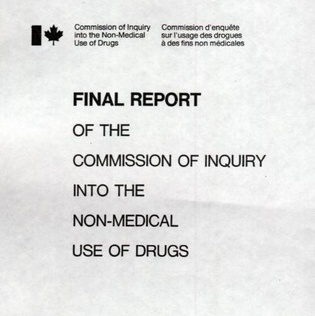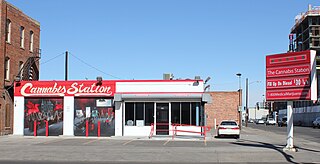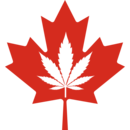
The Commission of Inquiry into the Non-Medical Use of Drugs, often referred to as the Le Dain Commission after its chair Dean Gerald Le Dain, was a Canadian government commission that was begun in 1969 and completed its work in 1972.

Cannabis in Canada is legal for both recreational and medicinal purposes. Medicinal use of cannabis was legalized nationwide under conditions outlined in the Marihuana for Medical Purposes Regulations, later superseded by the Access to Cannabis for Medical Purposes Regulations, issued by Health Canada and seed, grain, and fibre production was permitted under licence by Health Canada. The federal Cannabis Act came into effect on 17 October 2018 and made Canada the second country in the world, after Uruguay, to formally legalize the cultivation, possession, acquisition and consumption of cannabis and its by-products. Canada is the first G7 and G20 nation to do so.

Cannabis in British Columbia (BC) relates to a number of legislative, legal, and cultural events surrounding the use and cultivation of cannabis in the Canadian province of British Columbia. As with the rest of Canada, cannabis became legalized on 17 October 2018, following the enactment of the Cannabis Act, or Bill C-45. Prior to that, though the drug was illegal in Canada, its recreational use was often tolerated and was more commonplace in the province of BC as compared to most of the rest of the country. The province's inexpensive hydroelectric power and abundance of water and sunshine—in addition to the many hills and forests —made it an ideal cannabis growing area. The British Columbia cannabis industry is worth an estimated CA$6 billion annually, and produces 40 percent of all Canadian cannabis, making cannabis among the most valuable cash crops in the province. The province is also the home of the cannabis activist and businessman Marc Emery.

Cannabis dispensaries in the United States or marijuana dispensaries are a local government regulated physical location, typically inside a retail storefront or office building, in which a person can purchase cannabis and cannabis related items for medical or recreational use. First modeled in Amsterdam in the late 1970s where they were innocently called coffee shops, it would take the Americans more than a generation to successfully duplicate the idea of a retail cannabis storefront. Unlike in the Dutch coffee shops, today dispensary customers are prevented from consuming cannabis on the site of a regulated dispensary in all known markets.

Cannabis in Ohio is legal for medical use and illegal for recreational use. Since 1975, possession of up to 100 grams has been decriminalized, with several of the state's major cities having enacted further reforms. Medical use was legalized in 2016 through a bill passed by the state legislature.

Cannabis in Washington relates to a number of legislative, legal, and cultural events surrounding the use of cannabis. On December 6, 2012, Washington became the first U.S. state to legalize recreational use of marijuana and the first to allow recreational marijuana sales. The state had previously legalized medical marijuana in 1998. Under state law, cannabis is legal for medical purposes and for any purpose by adults over 21.

The Cannabis Act (C-45) of June, 2018 paved the way for the legalization of cannabis in Canada on 17 October 2018. Police and prosecution services in all Canadian jurisdictions are currently capable of pursuing criminal charges for cannabis marketing without a licence issued by Health Canada. The Supreme Court of Canada has held that the federal Parliament has the power to criminalize the possession of cannabis and that doing so does not infringe upon the Canadian Charter of Rights and Freedoms. The Ontario Court of Appeal and the Superior Court of Ontario have, however, held that the absence of a statutory provision for medical marijuana is unconstitutional, and to that extent the federal law is of no force and/or effect if a prescription is obtained. The recreational use of cannabis has been legalized by the federal government, and took effect on 17 October 2018.

The Cannabis Act is a law which legalized recreational cannabis use in Canada in combination with its companion legislation Bill C-46, An Act to Amend the Criminal Code. The law is a milestone in the legal history of cannabis in Canada, alongside the 1923 prohibition.

Cannabis in Ontario is legal for both medical and recreational purposes. Cannabis in Canada has been legal for medicinal purposes since 2001 under conditions outlined in the Access to Cannabis for Medical Purposes Regulations, issued by Health Canada, while seed, grain, and fibre production are permitted under licence. The federal Cannabis Act, legalizing cannabis for recreational use, came into effect on 17 October 2018.

Cannabis in Quebec became legal when the national Cannabis Act went into force on 17 October 2018.

Cannabis in Nunavut, as in the rest of Canada, became legal for recreational use on the effective date of the Cannabis Act on 17 October 2018.

Cannabis on Canadian Indian reserves became legal under the Cannabis Act on October 17, 2018, subject to local restrictions. First Nations leaders have called for more local control of the cannabis economy on their reserves.

On October 17, 2018, cannabis was legalized in Canada for recreational and medical purposes. It was already legal for medicinal purposes, under conditions outlined in the Marijuana for Medical Purposes Regulations issued by Health Canada, and for seed, grain, and fibre production under licence by Health Canada.

Cannabis in Prince Edward Island became legal when the national Cannabis Act went into force on October 17, 2018.

Cannabis has been legal in Nova Scotia and the entire country of Canada since October 17, 2018, the effective date of the Cannabis Act. Each province and territory set its own laws for various aspects, such as the legal age, whether householders can grow cannabis and the method of retail sales. Cannabis has been legal in Canada for medicinal purposes since 2001 under conditions outlined in the Marihuana for Medical Purposes Regulations, later superseded by the Access to Cannabis for Medical Purposes Regulations, issued by Health Canada and seed, grain, and fibre production was permitted under licence by Health Canada.

Cannabis in Newfoundland and Labrador became legal when the national Cannabis Act went into force on October 17, 2018.
Cannabis in Yukon became legal when the national Cannabis Act went into force on October 17, 2018.

Cannabis in Saskatchewan became legal when the national Cannabis Act went into force on 17 October 2018.

Cannabis in the Northwest Territories became legal when the national Cannabis Act went into force on 17 October 2018.

The Ontario Cannabis Retail Corporation, operating as Ontario Cannabis Store (OCS), is a Crown corporation that manages a legal monopoly over the online retail and wholesale distribution of recreational cannabis to consumers and privately operated brick and mortar retailers respectively throughout Ontario, Canada.











